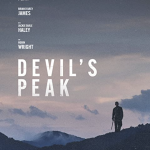Emily imagines the transformative, exhilarating, and uplifting journey to womanhood of a rebel and a misfit, one of the world’s most famous, enigmatic, and provocative writers who died too soon at the age of 30.
Chuck says:
Actor Frances O’Connor is fully aware that her debut film as a writer/director, “Emily” is the product of as much imagination as fact. In a statement regarding her approach she states, “This is not a biographic film of Emily Bronte. My intention is to show the true spirit of Emily by telling a story that is thematically true to who she was, to make her story feel documented and real but to also have these fantastic moments of dark creativity, emotion and magic.” To be sure, very little is known about Bronte’s life, much supposition surrounding just what her inspiration was for her novel “Wuthering Heights,” the extent of her romantic life and just what led to her premature death. So, in a sense, her story is one that welcomes fact-based imagination to fill in the gaps. That being said, at times the liberties O’Connor takes here stretch the boundaries of logic and realism.
The film begins with Emily (Emma Mackey) at death’s door, having been laid low by a bout of tuberculosis contracted at her brother’s funeral a week earlier. Made comfortable, but obviously fading, her sister Charlotte (Alexandra Dowling) asks her, “How did you do it? How did you write ‘Wuthering Heights?’” A series of flashbacks ensue that attempt to answer this question, a portrait of a shy, repressed, brilliant young woman emerging.
Her mother having died when she was three years-old, Emily and her five siblings were raised by their stern father, a curate who held sway over the conservative household with an iron hand. While Charlotte and Anne (Amelia Gething, respectively) do their best to please their father, Emily and her brother Branwell (Fionn Whitehead) bristle against the oppressive environment.
However, there seem to be two sources of solace for Emily. A loner by nature, she spends an inordinate amount of time on the moors not far from her home. Perpetually overcast and windy, wild in appearance and nature, Emily is at peace here, spending many hours alone with her thoughts, finding comfort in an atmosphere that reflects herself. Meanwhile, the arrival of William Weightman (Oliver Jackson-Cohen), a new curate to the parish that her father takes under his wing, stirs something dangerous and unknowable within the young woman. Despite their both knowing that any romantic relationship between them is forbidden, they embark on a love affair doomed to failure.
Cinematographer Nanu Segal captures the English moors in all their oppressive glory, a sense of foreboding ever present, powerfully driving home the notion that living in such an environment couldn’t help but cloud a depressive’s mood. O’Connor posits that this, as well as Emily’s relationship with Weightman, are the foundation for “Wuthering Heights,” as are other events those familiar with the novel will immediately recognize. It’s an interesting theory and holds as much water as any other supposition about the author and her work, but I doubt Bronte scholars would carry this conjecture as far as the filmmaker does here. The author taking opium trips and getting a defiant tattoo on her forearm speaks more to 20th century acts of rebellion and proves narratively jarring rather than inspired.
To be sure, “Emily” is a good-looking, well-acted film that serves as interesting mirror-image of “Heights.” While the second act is a bit of a slog, overall, it is an immersive experience, the dark tone of the film impressive and inescapable. More than likely, you’ll be digging out your old copy of Bronte’s classic to revisit it with this context in mind. In the end, I suspect that was O’Connor’s intent all along.
3 Stars




